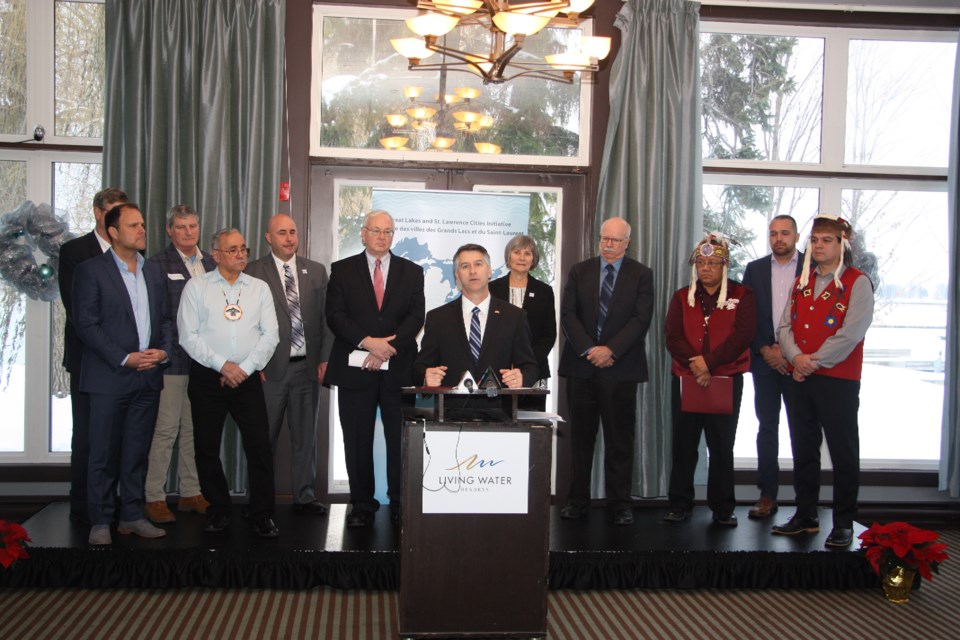First Nations leaders and Canadian and U.S Mayors gathered in Collingwood today to call for stricter rules for water withdrawals from the Great Lakes and St. Lawrence River.
The Great Lakes and St. Lawrence Cities Initiative (GLSLCI) and Anishinabek Nation leadership hosted a press conference in Collingwood at Living Waters Bear Estate today.
Mayor Sandra Cooper is the chair of GLSLCI.
“Withdrawals need to be the rare exception,” said Cooper. “Unfortunately, our energies have been focused on preventing weakening to the rules, we didn’t obtain our objective to strengthen them.”
Cooper and other speakers at the press conference referred to a document on the table for a Dec. 6 meeting of the Great Lakes St. Lawrence River Basin Water Resources Compact (Compact Council). The document is meant to be the new standard for approving applications for water withdrawal from the Great Lakes and St. Lawrence, which is an action prohibited as a rule. In certain cases, the Compact Council has granted an exception to allow water withdrawal.
The Great Lakes St. Lawrence River Basin Water Resources Compact is a legal agreement between eight states (Illinois, Indiana, Michigan, Minnesota, New York, Ohio, Pennsylvania, and Wisconsin) for managing the use of the Great Lakes Basin water supply.
According to GLSLCI President and CEO John Dickert, that council does consult with the two Canadian provinces on the water, but does not involve them in decision-making.
Dickert said today’s event was an “historic occasion” and represented the first time GLSLCI and the Anishinabek Nation had partnered on the issue.
Regional Deputy Grand Chief of Robinson Superior Territory Edward Wawia was in Collingwood for the press conference. He said First Nations need to be involved and consulted in decisions affecting the Great Lakes and St. Lawrence River.
“The Compact has complete control over decisions,” he said. “We need to be part of the decision-making process.”
Anishinabek Nation Grand Council Chief Glen Hare said there are many “learning” points in the document going before the compact council on Dec. 8. He didn’t call them weaknesses, but rather said they represented points where everyone could do better. He also wants to see an effort without deadlines so the protection of the Great Lakes and St. Lawrence River is ongoing forever.
“We have to leave something good for our kids,” said Hare. “If we lose our water, we are gone also … water is life ... this is the one thing in this world that we need to come together on.”
Chief Jason Henry from Kettle and Stoney Point, and Ogimaa Duke Peltier of Wiikwemkoong Unceded Territory were also at the press conference and participating in GLSLCI meetings.
According to GLSLCI there are two main issues with the new rules for water withdrawals.
First the group sees insufficient opportunity for public involvement in applications to take water from the Great Lakes. Second, the group sees a lack of enforcement as a significant issue.
“Without explanation, the updated guidance and procedures eliminated the requirement that diversion applicants provide a monthly estimate of how much water they propose to divert from the Great Lakes,” states a press release backgrounder from GLSLCI.
Mike Vandersteen, mayor of Sheboygan, Wisconsin, called on the compact council to defer the decision, saying one made today would be a “lame duck” scenario.
“There’s been a substantial change in new leadership in Canada and the U.S, they should have time to review the issue before making a decision,” said Vandersteen.
According to a press release from GLSLCI, the mayors and Anishinabek Nation have been participating in “good faith” discussions with the compact council over the last 14 months, but are disappointed with the results.
According to Dickert, the Great Lakes and St. Lawrence River provide drinking water for 40 million people, and the region is the third largest economy in the world next to China and the U.S.
The GLSLCI includes mayors from more than 100 Canadian and US towns and cities bordering the Great Lakes and St. Lawrence River.
For more on the Great Lakes and St. Lawrence Cities Initiative, click here. To read the proposed guidelines and procedures for dealing with applications for water withdrawals going to the compact council’s next meeting Dec. 6, click here. For more on the compact council, click here.



